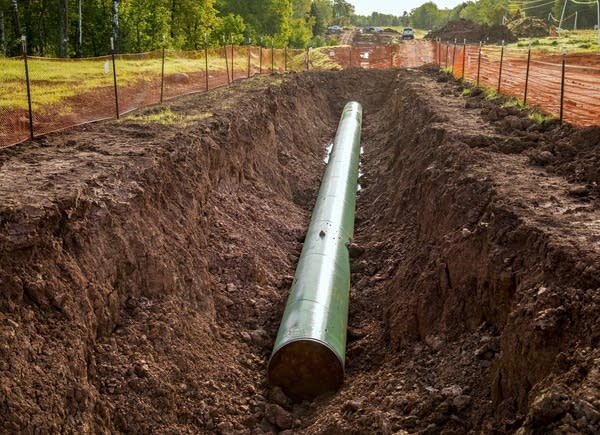Line 3 pipeline clears another hurdle as environmental study gets OK

Go Deeper.
Create an account or log in to save stories.
Like this?
Thanks for liking this story! We have added it to a list of your favorite stories.
A proposed oil pipeline in northern Minnesota cleared a major regulatory hurdle Thursday when the Minnesota Public Utilities Commission unanimously approved the final environmental review of the proposed Line 3 pipeline.
State regulators had rejected the 5,000-plus page report in December, sending it back to the state Department of Commerce for four relatively minor revisions.
Now, the commissioners say the report is adequate. It's not a final decision on the project, but clears the way for the state to make decisions on key permits Enbridge Energy would need to build the project. The decision on whether the pipeline is needed is expected in June.
"I believe it's a milestone in the regulatory process that we've been committed to from the beginning," Enbridge project director Barry Simonson said after the hearing.
Turn Up Your Support
MPR News helps you turn down the noise and build shared understanding. Turn up your support for this public resource and keep trusted journalism accessible to all.
"The replacement of Line 3 is superior to keeping Line 3 active and operating as it is today."
Enbridge wants to replace its existing Line 3 with a new pipe along a different route across northern Minnesota.
The current line, built in the 1960s, is corroding and cracked. As a result, Enbridge has had to reduce pressure on the pipeline, and cut the amount of oil it ships from 760,000 barrels per day, to 390,000.
A new pipe would allow the company to restore the line to its original capacity, and transport more crude from the Oil Sands region of Alberta, Canada to refineries in the Midwest and beyond.
But the project has met furious resistance from a number of different sides, including climate change activists, tribal groups opposing the pipe's proposed path across ceded territory in northern Minnesota, and citizens groups concerned about the impact potential spills could have on lakes, rivers and wild rice waters.
"Shame on you!" shouted Lorna Hanes at the commissioners after they issued their ruling. "This is not appropriate, you're in the land of 10,000 lakes. Why would you want to destroy that?" said Hanes, who lives on the White Earth reservation, after the hearing.
Scott Strand, attorney for Friends of the Headwaters, said he's disappointed but not surprised in the decision. The Friends group filed a lawsuit that helped lead to the environmental study, the first-ever environmental impact statement on a proposed pipeline in Minnesota.
"We still are left with an environmental impact statement that really doesn't tell us what would happen if there was an oil spill in some of the places of greatest ecological importance and sensitivity in the state, and we don't have a fair comparison of alternatives," he said.
Strand said he expects tribes or organizations intervening in the proceedings will challenge the PUC ruling at the Minnesota Court of Appeals. They have 30 days to file an appeal.
But supporters of the project say the regulatory process has already dragged on for too long.
"It's time to make a decision," said Minnesota House Speaker Kurt Daudt, R-Crown, at a rally before the hearing. "This has been an extensive three-year process. It's aging infrastructure that needs to be replaced."


